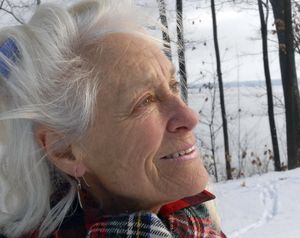Pioneering outdoorswoman Anne LaBastille dies
OUTDOOR PEOPLE -- A woman who became cult hero as a naturalist an outdoorswoman in the 1970s has died after a long illness.
When her marriage fell apart in the mid-1960s, Anne LaBastille took refuge in the wilderness, building a log cabin on a hidden lake in the Adirondack Mountains and then carving an influential writing career out of her remote existence, the New York Times reports.
The women's and environmental movements were on the rise in 1976 when she published "Woodswoman," the first in a four-volume autobiographical series that celebrated her adventures - and inspired women across the nation to engage in the great outdoors.
LaBastille, who had Alzheimer's disease, died July 1 at a care facility in Plattsburgh, N.Y., said her friend Doris Herwig. She was 77.
Read on for more details from the Associated Press.
"She had a huge impact on at least two generations of predominantly women," said James Lassoie, a professor of international conservation at Cornell University in upstate New York who worked on projects with LaBastille. "Those books were really important for a large cohort of women interested in conservation and the outdoors - hiking, guiding, fishing - all things that Anne did."
Bags of mail addressed to "Woodswoman, Adirondack Park, N.Y." piled up on her dock, and her later writings addressed the oddities of dealing with fame while living for the most part as a recluse.
Even though she hid the identity of "her lake" in the western Adirondacks by referring to it as Black Bear Lake in her books, curious fans still figured out it was Twitchell Lake and tracked her down. One kayaker who startled her while she was typing outside in a bikini reacted with anger when she sent him away.
Partly to escape such intrusions, LaBastille retreated even farther into the woods, building a tiny cabin that she modeled on Henry David Thoreau's cottage on Walden Pond. The $130 it took to build the cabin was only about $100 more than Thoreau had spent to construct his in 1845, she later wrote.
Although she would become an outspoken defender of her natural Adirondack surroundings, her own missteps included building her first cabin too close to the lake. Friends rectified the land-use violation by sliding logs underneath the cabin during a rainstorm and pushing it back while LaBastille typed away inside.
"When she was in her writing mode, you may as well close off the world," said Herwig, who met the author nearly 50 years ago when LaBastille wrote about the Adirondacks for National Geographic.
"Here she came in this clickety, rickety old truck," Herwig recalled. "She had a dog with her like she always did. Out steps Daisy Mae, with bare feet and a little poufy Daisy Mae blouse and long blond pigtails."
Some critics saw LaBastille as a "pistol-packing, backwoods eccentric," but she had evolved into a respected conservationist with an international reputation, the Post-Standard in Syracuse, N.Y., said in 1999.
Her reach as an environmentalist extended to Guatemala, where she had discovered the flightless bird known as the giant pied-billed grebe at Lake Atitlan while leading nature tours in 1960.
When LaBastille returned five years later to study the rare bird, its population had declined by 50 percent. She wrote her doctoral dissertation for Cornell on the plight of the grebe, or "poc" as the bird was known locally, and spent 24 years campaigning to save it.
She persuaded the Guatemalan government to make the grebe's habitat a wildlife refuge, launched educational programs and wrote about the doomed bird in her 1990 book "Mama Poc," the nickname local residents gave her.
"Her work with the giant grebe was one of the few studies where someone, over a long period of time, monitored the extinction of a species," Lassoie said. "The work was scientific but had a real personal and humanitarian part to it."
The only child of Ferdinand LaBastille, a professor, and his musician-writer wife, Irma, she was born in Montclair, N.J., on Nov. 20, 1933, a date confirmed by her friend and public records.
She often presented her initial love of the outdoors as an act of rebellion because her mother would not let her go camping as a child.
After earning a bachelor's degree in natural resources from Cornell in 1955, she worked as a tour guide in South Florida and fell in love with another guide, who owned a rustic lodge in the Adirondacks. She eventually married the innkeeper.
When the inn was closed in winter, the couple led natural history tours. They divorced after seven years of marriage. She has no immediate survivors.
LaBastille earned a master's degree from Colorado State University in 1958 and obtained her doctorate in natural resources from Cornell in 1969.
For 17 years she served as a member of the Adirondack Park Agency board, which regulates land use in the 6-million-acre park.
In later years, she bought a farm near Lake Champlain to escape the harsh winters at the cabin and experience such modern comforts as electricity and a fax machine, which helped her promote the more than a dozen books she wrote.
"Living in backcountry has taught me not to meddle, except under crisis conditions," she once wrote. "Nature is running its own show."

